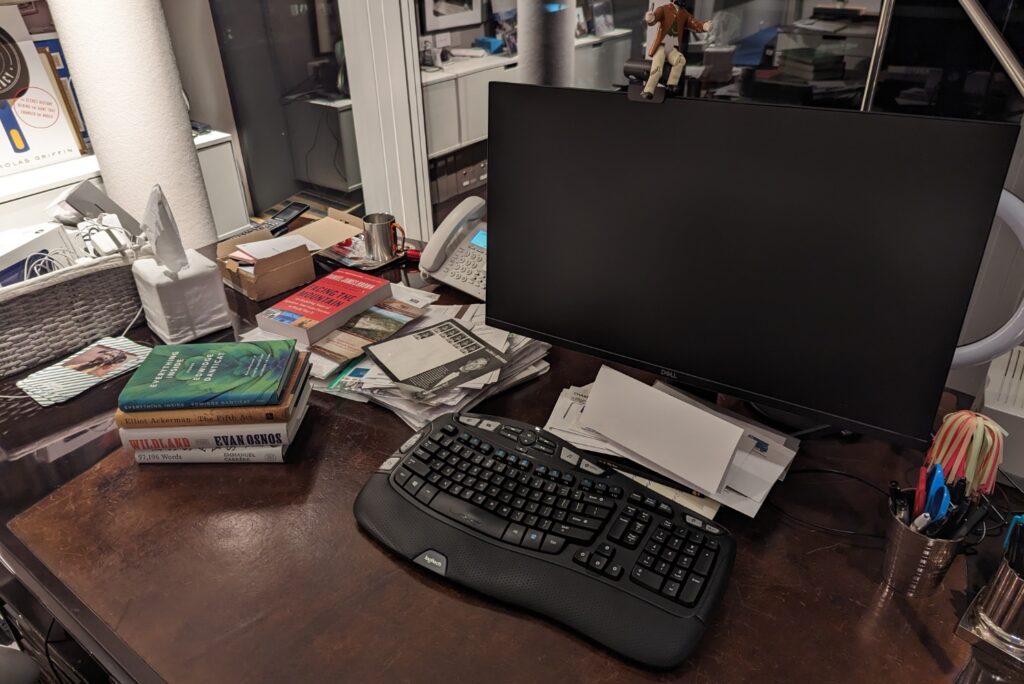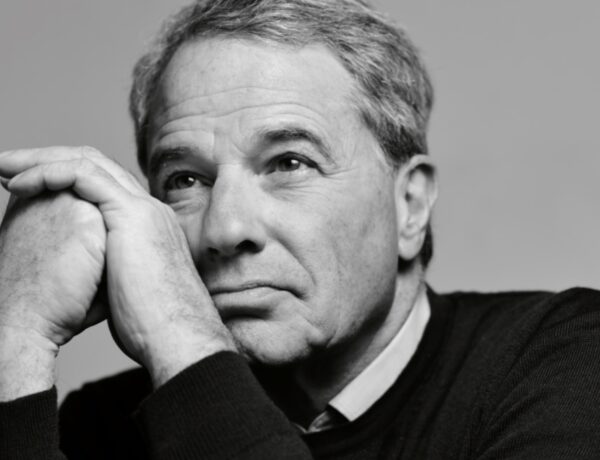Nicholas Griffin is a journalist and author of four novels and three works of nonfiction. He was born in London and moved to the United States as a teenager.
He has been publishing books for over 20 years and has written in a variety of genres, including fiction, history, television, film, drama, magazine and newspaper articles. His writing has appeared in The Times (London), the Financial Times, and Foreign Policy, among other publications.
His book Ping-Pong Diplomacy: The Secret History Behind the Game That Changed the World was shortlisted for the PEN/ESPN Award for Literary Sports Writing. Nicholas’ latest book, The Year of Dangerous Days: Riots, Refugees, and Cocaine in Miami 1980, is a history of Miami in the year 1980, when the city was facing a race riot, a drug epidemic and an immigration crisis.
Each week, we publish a new daily writing routine from a famous author. Subscribe to our newsletter so you don’t miss out!
Hi Nicholas! We’re delighted to have you as a guest on Famous Writing Routines. For our readers who may not be familiar with your work, could you please give us a brief introduction to yourself?
I’m London born but moved to the US when I was still a teenager. I’ve been publishing books for over twenty years now. I started off writing fiction and slowly moved across to non-fiction. My first book was the novelization of a family member – an 18th century Bahamian salt-raker turned pirate (spoiler alert: he didn’t last very long in his new job).
My last book was called The Year of Dangerous Days, a history of Miami in the year 1980 when the city imploded under the pressures of a race riot, a drug epidemic and an immigration crisis. It’s seen through the eyes of the captain of homicide, a female crime reporter, a Colombian money launderer and the mayor.
There was so much to process, so many people to interview that it took me over four years. At this point, there’s not much I haven’t written: fiction, history, television, film, drama, magazine and newspaper articles. My only regret is that I wrote a big book for my kids when they were young, set in a boarding school for insufferably spoiled children, but it’s the one thing I couldn’t figure out how to publish.
What inspired you to become an author and what drew you to writing novels and nonfiction?
I remember reading the line, ‘write the book you wanted to read but couldn’t find’. That’s served me well. I’m curious by nature but I move in slow motion. I can be intrigued by say, con artists, for a year or two and then I want to move on. So that’s very much how the subjects of my books have been chosen – from deep, temporary interests that last more than long enough to provide sustenance for a book.
How do you balance your journalistic background with the creative freedom of writing a novel?
I guess I have a slightly odd career trajectory. A bit of journalism, then novels, then histories. I’m glad I started by writing novels and moved across to non-fiction. Novels have an extraordinary freedom but you’ve also got the entire weight of plot and pacing on your shoulders.
Plenty of non-fiction writers just put their heads down and move chronologically through events. That can work very well but novels help teach moments of revelation, timing, when to dig deep and how to know when you’re digging too deep. All of that is extraordinarily useful in creating a nonfiction world.
For instance, I wrote a history book called Ping-Pong Diplomacy. It was about an English aristocrat who ended up spying for Stalin, making films for Hitchcock, writing the rules of table tennis and bringing the sport to China – for Mao to deliberately use as a diplomatic tool against the United States. It’s a story I’d never have dared to invent as fiction, but I think writing fiction helped me handle a plot that could have pulled in a dozen different directions at once.

Can you describe your writing routine? How do you make time to write and stay organized with your research and writing?
I lived in New York for many years and would just pretend that I had a (relatively) normal job. I’d show up when the NY Public Library opened and sit in the Rose Reading Room doing my research or my writing. I’m a compulsive creator of ‘one more file’ on my computer and they’re organized, like my books, a bit too haphazardly.
That’s not always because I embrace inefficiency, it’s more that inefficiency is the by-product of the beginning of my books. I just don’t always know where I’m going. Even when I do, an editor can disagree with my chosen destination.
Rewriting means going backwards, unearthing nuggets in files I haven’t opened in months or maybe years. I never find anything easily and I know there are all sorts of digital tools to help me these days, but I’ve become accustomed to living in semi-chaos.
My desk, as you can see, is only semi-chaotic. Some of those piles of paper look organized. They’re not. They probably contain notes for my next book, notes from my last book, notes from a book I’ll never write, my taxes and prescriptions for dog medicine.
How do you manage your time and stay productive while working on multiple writing projects at the same time?
Generally, I like saying yes and finding new challenges. I’ve just been commissioned to write my first play. I’ve written for film once before, written for television but here again is something that has familiar parts (we’ll call them words) but is an entirely new medium for me.
Every one of these mediums has its own rules, shortcuts and possibilities. Also, if I wasn’t relatively shy, I’d probably have liked to have been an actor. Now that I’m working on a play, I can write a scene, sit in my office and do all the voices. My dog pricks up her ears, cocks her head and asks ‘Really?’ My kids don’t interrupt. They already know I’m nuts.
How do you handle writer’s block or moments of creative stagnation?
I just keep the wheels moving. You’re stuck on your novel? Try starting a play. Stuck on the play, how about a speech for your brother’s birthday party? Don’t have a brother? It doesn’t matter. The point is that imagination is a muscle that can only be translated into words by effort.
So you’ve got to make the effort, even if you’re sure no one will ever read the words that are a product of that effort. My files are filled with hundreds of false starts, bad ideas, and incomplete sentences. Occasionally, I scroll through them. More occasionally, I can pull out two forgotten pieces and find that together they create something salvageable.
If you could have a conversation with an author throughout history about their writing routine and creative process, who would that person be?
I grew up in England. We were taught Dickens at school and for me it started off as pure weight. Do I have to read this? What’s the exam about? And then I was gripped by the world he conjured, by the moral complications, by the pacing.
HBO may be a 20th century company but it’s pretty much a Dickensian model. There’s an installment (in Dickens’ case once a month) that is part of a season (around 20 months in total). You have to leave the reader wanting more, you have to gently remind them of what they might have forgotten.
But most of all, you have to have something for them to read the following month. I’d love to have seen Dickens with the pages laid out across his room, literally cutting and pasting together the stories that kept hundreds of thousands on tenterhooks.
I’d love to know what you’re reading at the moment. What have been some of your favorite books you have read recently?
I’ve just finished G-Man: J. Edgar Hoover and the Making of the American Century, the Beverley Gage history about J.Edgar Hoover. Before that, I’d read Making History: The Storytellers Who Shaped the Past – an extraordinary book by Richard Cohen that circles the question of ‘Shouldn’t you know who’s writing the history you say you believe?’
It made me reconsider Hoover himself. For his fifty years in control of the FBI he’s like a writer creating an ever-expanding institution that ends up mirroring himself – full of deft political moves, deep-set hypocrisy, but mostly highly effective.
What does your current writing workspace look like?
I’ve lived in Miami for about ten years now. I write surrounded by books with a window with a view of the port. But the truth is that I also have a ‘hot desk’ at a local co-working space. 23 years of being a writer has taught me that I can write surrounded by people as long as I’m wearing headphones. And when I pull them off, there’s actually someone to chat to over coffee.

Affiliate disclaimer: Some links on this website are affiliate links. We may earn a small commission if you make a purchase through these links, but only promote products we truly believe in. We disclose affiliate links and give honest reviews.



No Comments